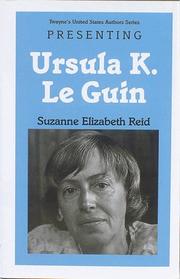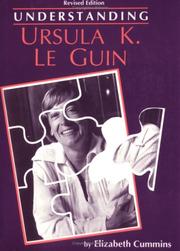| Listing 1 - 10 of 10 |
Sort by
|
Book
ISBN: 9780192847881 Year: 2023 Publisher: Oxford ; New York : Oxford University Press,
Abstract | Keywords | Export | Availability | Bookmark
 Loading...
Loading...Choose an application
- Reference Manager
- EndNote
- RefWorks (Direct export to RefWorks)
What makes readers fall in love? You might want to start your answer by explaining Ursula Le Guin. She owned John Plotz at age eight, on the overlit and understaffed second floor of the DC library. Four decades and who knows how many re-readings later, her Earthsea owns him still. The reasons to love her Earthsea are many. Le Guin sets readers adrift among worlds: peripatetic but somehow at home. She sublimely mixes comfort and revelatory, emancipatory unsettlement. Ursula Le Guin's Earthsea aims to do justice to both Le Guin's passionate simplicity and her revenant complexity. Small wonder the inspiration she has been for later speculative writers like Neil Gaiman, Kim Stanley Robinson, and N. K. Jemisin. The boldness and coldness of the later three books of Earthsea is a revelation. In Tehanu, Tales from Earthsea, and The Other Wind, she turned a cold eye, a dragon's searching eye, back on the comfortable green world she herself had made decades earlier. They unfold a distinctive vision of the writer's task: worldbuilding as responsibility plus openness. Call it invitational realism. She builds a world that leaves the real task of building, of creating of imagining and of reimagining, with her readers. Drawing on his own crooked path—from a DC childhood to teaching in Prague to San Francisco journalism to graduate school and then parenthood—Plotz maps the ways that readers young and old find in Earthsea a kind of scholar's stone, a delightfully mutable surface that rewards recurrent contemplation.

ISBN: 0805746099 Year: 1997 Publisher: New York, NY : Twayne,
Abstract | Keywords | Export | Availability | Bookmark
 Loading...
Loading...Choose an application
- Reference Manager
- EndNote
- RefWorks (Direct export to RefWorks)
Book
ISBN: 9782841627028 2841627020 Year: 2024 Publisher: [Paris]: Éditions de l'Éclat,
Abstract | Keywords | Export | Availability | Bookmark
 Loading...
Loading...Choose an application
- Reference Manager
- EndNote
- RefWorks (Direct export to RefWorks)
Dans ce nouveau volume d'essais et de conférences d'Ursula K. Le Guin, on trouve des îles inexplorées ou imaginaires, des oncles papago et yurok, des bibliothèques et des danseurs, des chats et des viscaques, Ishi et Jorge Luis Borges, Virginia Woolf, Mark Twain, Jane Austen, Léon Tolstoï ou Cordwainer Smith, enfants dissipés et vieilles espiègles, collectionneurs, rimailleurs, personnages en tout genre, dans un ordre compliqué qui suit les seules aspirations d'une pensée pleinement libre et singulière, refusant les catégories, enjambant les frontières et dessinant la carte d'un monde où la fiction et la fantaisie révèlent l'intelligence des choses
Art d'écrire. --- Authorship. --- Création littéraire. --- Creative writing. --- Littérature --- Literature --- Philosophie. --- Philosophy. --- Le Guin, Ursula, --- Le Guin, Ursula K.,
Book
ISBN: 9782841624515 284162451X Year: 2020 Publisher: Paris: Éditions de l'Éclat,
Abstract | Keywords | Export | Availability | Bookmark
 Loading...
Loading...Choose an application
- Reference Manager
- EndNote
- RefWorks (Direct export to RefWorks)
L'œuvre de (science)-fiction d'Ursula K. Le Guin est internationalement connue. Elle s'accompagne de quelques essais qui en interrogent le contenu et permettent de mieux en comprendre les enjeux et les implications. Ce volume, qui rassemble 34 essais et conférences publiés entre 1976 et 1988, permettra aux lecteurs de pénétrer dans le monde de Le Guin, peuplé de mots, de femmes et de territoires, au miroir duquel se ‘réfléchit' le nôtre. On y retrouve son audace singulière qui n'hésite pas à mélanger les genres et à traiter tout à la fois de ménopause, de responsabilité sociale dans l'Empire nord-américain de la fin du XXe siècle, d'utopies littéraires ou de poésie des femmes indiennes. Ursula K. Le Guin, comme Philip K. Dick, fait partie des visionnaires de la littérature, qui méritent de figurer de plein droit au panthéon des grands écrivains du siècle.
Le Guin, Ursula K., --- Féminisme. --- Feminism. --- Femmes --- Women in literature --- Art d'écrire. --- Writing. --- Dans la littérature --- In literature. --- Le Guin, Ursula,

ISBN: 0585337284 9780585337289 0872498697 Year: 1993 Publisher: [Place of publication not identified] University of South Carolina Press
Abstract | Keywords | Export | Availability | Bookmark
 Loading...
Loading...Choose an application
- Reference Manager
- EndNote
- RefWorks (Direct export to RefWorks)
Women and literature --- Fantasy fiction, American --- American Literature --- English --- Languages & Literatures --- History --- History and criticism --- Le Guin, Ursula K., --- Criticism and interpretation. --- LeGuin, Ursula, --- Le Guin, Ursula, --- Guin, Ursula K. Le, --- Kroeber, Ursula, --- Ле Гуин, Урсула, --- גווין, אורסולה ק׳, --- Le guin (ursula k.), 1929 --- -Women and literature --- -Le guin (ursula k.), 1929 --- History and criticism.
Book
ISBN: 9788412073843 Year: 2020 Publisher: Barcelona : Alpha Decay,
Abstract | Keywords | Export | Availability | Bookmark
 Loading...
Loading...Choose an application
- Reference Manager
- EndNote
- RefWorks (Direct export to RefWorks)
Science-fiction américaine --- Femmes écrivains américaines --- Création littéraire. --- Histoire. --- Biographie. --- Le Guin, Ursula, --- Critique et interprétation.
Book
ISBN: 9780995716278 0995716277 Year: 2023 Publisher: Place of publication unknown Silver Press
Abstract | Keywords | Export | Availability | Bookmark
 Loading...
Loading...Choose an application
- Reference Manager
- EndNote
- RefWorks (Direct export to RefWorks)
'Space Crone' brings together celebrated author Ursula K. Le Guin's writings on feminism and gender. Witness to the twentieth century's rebellions and upheavals, including women's liberation, the civil rights movement and anti-war and environmental activism, Le Guin continued to fight for social and environmental justice throughout her life. Famous for her experiments in imagining society where gender is irrelevant in novels such as 'The Left Hand of Darkness', Le Guin's feminism kept ahead of the times to reimagine gender in a non-essentialising way. 'Space Crone' shows the development of Le Guin's expansive, multi-layered and deeply radical feminist consciousness from its roots in her ecological, anti-war and anti-nuclear activism, to her self-education about racism and her writing about ageing.
Féminisme et littérature. --- Gender identity --- Feminism --- Sociology of the family. Sociology of sexuality --- essays --- feminisme --- gender --- Le Guin, Ursula K. --- Feminist fiction, American --- Women --- Sex role --- Women's rights --- History and criticism --- Social conditions --- Le Guin, Ursula K.,
Book
ISBN: 9781350465954 9781350465992 Year: 2025 Publisher: London ; New York : Bloomsbury Academic,
Abstract | Keywords | Export | Availability | Bookmark
 Loading...
Loading...Choose an application
- Reference Manager
- EndNote
- RefWorks (Direct export to RefWorks)
A deep dive into the similarities between science fiction studies and critical posthumanism, this book establishes a common theoretical ground between the two fields upon which currents of future-oriented thought can meet and begin to share a common language. An investigation into the everyday condition of humanity in relation to technology and our perilous situation in the Anthropocene, the book features case studies of sci-fi authors Isaac Asimov, Ursula K. Le Guin and Kim Stanley Robinson, Doctor Who and the videogame Outer Wilds. Formulating a new critical paradigm which recognises the value of such works to posthumanist thought, it demonstrates that urgent discourses around our shared future are more imperative than ever.
American literature --- American literature --- Science fiction, American --- Humanism. --- Human ecology in literature. --- History and criticism. --- History and criticism. --- Asimov, Isaac, --- Le Guin, Ursula, --- Robinson, Kim Stanley,
Book
ISBN: 3035399697 3035306109 3034307527 Year: 2014 Publisher: Bern, Switzerland : Peter Lang, International Academic Publishers,
Abstract | Keywords | Export | Availability | Bookmark
 Loading...
Loading...Choose an application
- Reference Manager
- EndNote
- RefWorks (Direct export to RefWorks)
Although published in 1986, Demand the Impossible was written from inside the oppositional political culture of the 1970's. Reading works by Joanna Russ, Ursula K. Le Guin, Marge Piercy, and Samuel R. Delany as indicative texts in the intertext of utopian science fiction, Tom Moylan originated the concept of the «critical utopia» as both a periodizing and conceptual tool for capturing the creative and critical capabilities of the utopian imagination and utopian agency. This Ralahine Classics edition includes the original text along with a new essay by Moylan (on Aldous Huxley's Island) and a...
Science fiction, American --- Utopias in literature. --- American fiction --- History and criticism. --- Russ, Joanna, --- Le Guin, Ursula K., --- Piercy, Marge, --- Delany, Samuel R., --- USA.
Book
ISBN: 3031246403 303124639X Year: 2023 Publisher: Cham : Springer Nature Switzerland : Imprint: Palgrave Macmillan,
Abstract | Keywords | Export | Availability | Bookmark
 Loading...
Loading...Choose an application
- Reference Manager
- EndNote
- RefWorks (Direct export to RefWorks)
Written not so long after "Tolkien mania" first gripped the United States in the 1960s, Ursula K. Le Guin's novel A Wizard of Earthsea (1968) has long been recognized as a classic of the fantasy genre, and the series of Earthsea books that followed on it over the next several decades earned its author both considerable sales and critical accolades. This new introduction to the text will closely contextualize the original novel in relation to its heady decade of composition and publication — a momentous time for genre publishing — and also survey the half century and more of scholarship on Earthsea, which has shifted in direction and emphasis many times over the decades, just as surely as Le Guin frequently adjusted her own sails when composing later works set in the fantasy world. Above all, this book positions A Wizard of Earthsea as perhaps an "old text" that nevertheless belongs in a "new canon," a key novel in the author's career and the genre in which it participates, and one that at once looks back to Tolkien and his own antecedents in masculinist early fantasy; looks forward to Le Guin's own continuing feminist and progressive education; and anticipates and indeed helped to shape young adult literature in its contemporary form. Timothy S. Miller is Assistant Professor of English at Florida Atlantic University, USA.
Literature, Modern—20th century. --- Literature, Modern—21st century. --- Children's literature. --- Literature—History and criticism. --- Literature—Philosophy. --- Feminism and literature. --- Sex. --- Contemporary Literature. --- Children's Literature. --- Literary Criticism. --- Feminist Literary Theory. --- Gender Studies. --- Gender (Sex) --- Human beings --- Human sexuality --- Sex (Gender) --- Sexual behavior --- Sexual practices --- Sexuality --- Sexology --- Literature and feminism --- Literature --- Juvenile literature --- Women authors --- Literature. --- Le Guin, Ursula K., --- Belles-lettres --- Western literature (Western countries) --- World literature --- Philology --- Authors --- Authorship --- LeGuin, Ursula, --- Le Guin, Ursula, --- Guin, Ursula K. Le, --- Kroeber, Ursula, --- Ле Гуин, Урсула, --- גווין, אורסולה ק׳, --- Literature, Modern --- 20th century. --- 21st century. --- History and criticism. --- Philosophy. --- Literature and philosophy --- Philosophy and literature --- Appraisal of books --- Books --- Evaluation of literature --- Criticism --- Literary style --- Theory --- Appraisal --- Evaluation
| Listing 1 - 10 of 10 |
Sort by
|

 Search
Search Feedback
Feedback About UniCat
About UniCat  Help
Help News
News